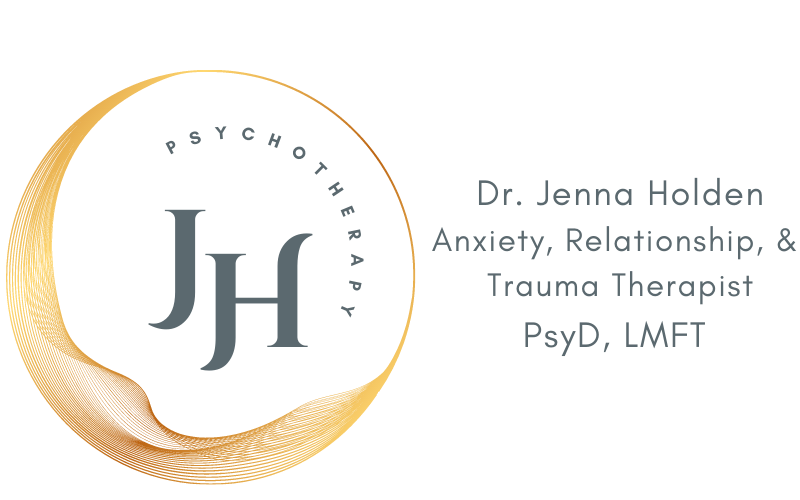
Virtual Therapy for Anxiety
Heal from home with phone and video sessions
BASED IN NEWPORT BEACH, SERVING ALL OF CALIFORNIA
Anxiety takes away more than your peace of mind.
Does this feel familiar to you?
Things that seem easy for others feel overwhelming for me
That feeling of dread before a social event
Perfectionism keeps me from finishing projects
It’s hard to make a decision without the input of others
When I do make a decision, I question myself
I get stuck in the overthinking loop and can’t stop myself

If you find yourself spending a lot of time thinking or talking about your worries to your partner, friends, or family, then having the weekly space and time to process these things can help.
-
Anxiety and worry are a natural part of life, but when these feelings are part of your everyday life, it’s time to address the core of the issue. Living in a constant state of unease is draining and unsustainable. If the target of your anxiety seems to always be moving, then general anxiety may be the culprit and a great goal to resolve in therapy.
-
Lots of factors can contribute to anxiety in relationships. Some may be situation-specific while others may be attributed to painful, unresolved issues of the past. Either type can fuel feelings of fear, doubt, sadness, and mood swings, creating distance when you just want to feel close.
Relationship anxiety can take many forms and have detrimental consequences. It can foster over-dependence and create continual fear that your partner will leave. A missed phone call or text can make you fear the worst, and ultimately overthink the relationship. It also interferes with building trust. Some will push others away to avoid being rejected, or avoid getting too deep with someone all together. Living in a perpetual state of worry is exhausting and can eventually put strain on your relationship.
-
I used to think anxiety could be a powerful motivator, however, I learned that there are much better and less taxing ways to achieve your goals. Anxiety is actually quite distracting, and can negatively impact the quality and quantity of your work. This can appear as procrastination, imposter syndrome, perfectionism, and just feeling stuck. It can inhibit your ability to concentrate, stifle creativity and block free-rolling ideas, extinguish the desire to engage with colleagues, crush motivation, and increase irritability. This can stagnate your professional growth and lead to overall burnout. If it isn’t addressed, anxiety in the workplace will likely spill over into your free time and personal life.
-
Parental anxiety involves constantly worrying about the safety of your children, intrusive thoughts of something bad happening, avoiding many situations out of fear even when the situation isn’t actually harmful, being the only person who can watch your child, meaning you never get a break to recharge your own batteries, and the list goes on.
While it may seem like this overactive anxiety is a protective measure to ensure your child’s well-being, at a certain point, it actually becomes distracting. Being a calm and present figure for your child is invaluable, and an incredible way to connect and build a secure attachment. It doesn’t matter how old your child is— it is never too late to provide this feeling of safety and connectedness.
-
Anxiety is rooted in the body as much as—if not more than—the mind. The effects are different for everyone and can range from full panic attacks to unpleasant physical sensations like chest pain, sweating, jittery energy, shaking, fainting, exaggerated startle response, sensory sensitivity and overstimulation, gastrointestinal problems, headaches, muscle spams, and tension in your chest, shoulders, and neck. Addressing the whole picture and mind-body system is imperative for managing anxiety and overall wellbeing.
Together, we’ll work on:
-
Coping Skills
Overactive anxiety is rooted in the body and the mind. The first step is to regulate the nervous system. To make the best decisions, we need to operate from logic brain, and not survival mode.
-
Identifying the Sources
Proactively get ahead of anxiety and stop chasing the symptoms. To achieve lasting results, we must create safety in our body, then identify and process our underlying negative core beliefs.
-
New Perspectives
Respond from a place of authenticity and certainty, not obligation and guilt. Make thoughtful decisions that align with your wants and needs. Protect your time and energy to spend it where you want to.

Anxiety therapy can help you:
Be more present in life’s special moments
Trust yourself and make decisions with confidence
Be more productive and engaged at work
Feel more secure in your relationships and connected to your partner, friends, and family
Be the source of your relief
Improve your physical health, sleep better, and restore your energy
Frequently asked questions about anxiety therapy:
-
Most first-line anxiety treatments address the symptoms of anxiety once they’ve already started. Coping skills and thought challenges are great in the moment, but it’s important to also address the cause of the anxiety to truly think, feel, and behave differently in the long term.
-
Everyone is different in their presentations of anxiety and the reasons they feel this way. It depends on your specific needs. Some people need just a few sessions, while others choose to keep this time and space for themselves to prioritize their self-care for longer amounts of time.
-
You can decide whether you want to have session over the phone or on video. Most of my clients with anxiety prefer to get comfy and chat on the phone. There’s no need to “pull it together” either way, there is never any judgment. Get the support you need from your bed, couch, in your pajamas, whatever makes you comfortable.
